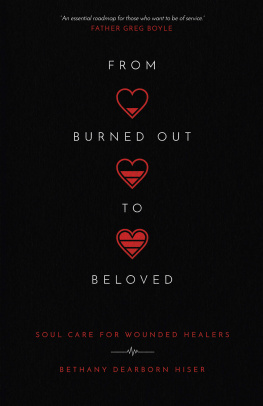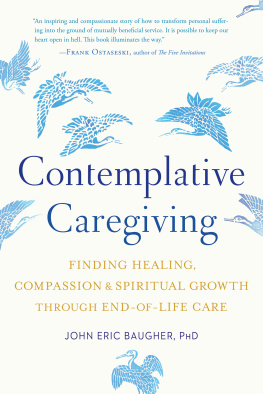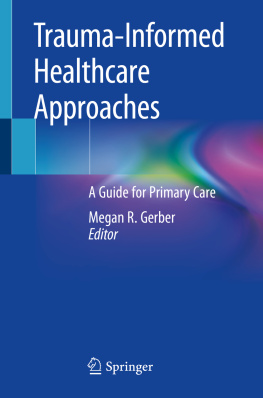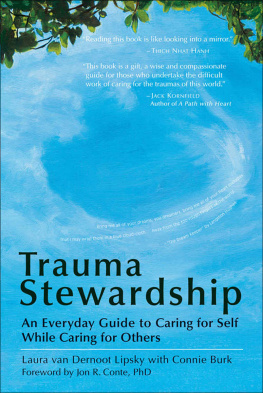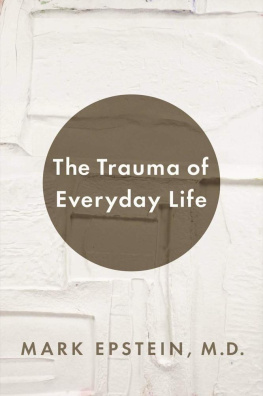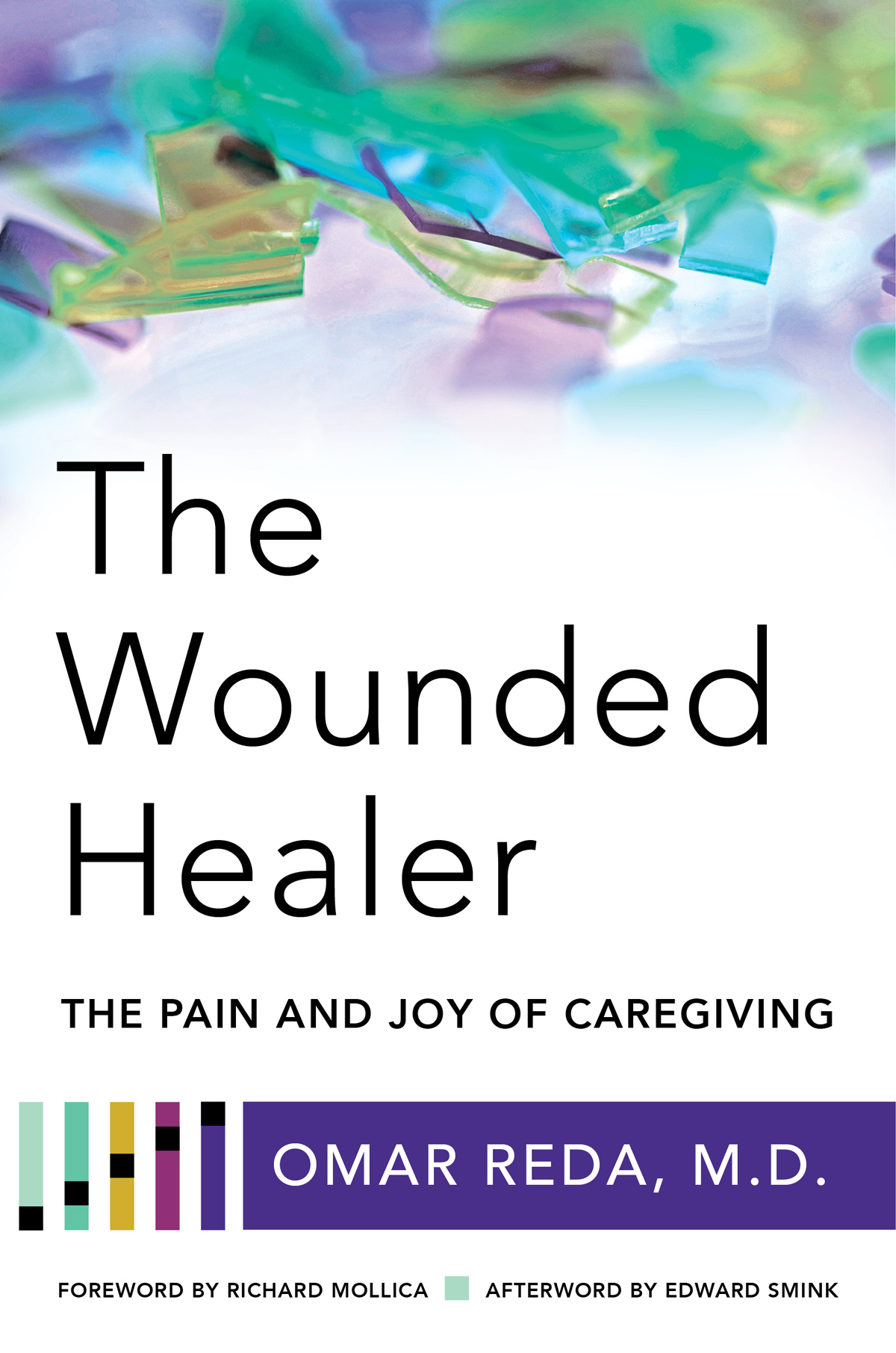Contents
Guide
Page List
The
Wounded
Healer
THE PAIN AND JOY OF CAREGIVING
OMAR REDA, M.D.
FOREWORD BY RICHARD F. MOLLICA
AFTERWORD BY EDWARD M. SMINK
To those risking their safety and sacrificing their comfort, so we can enjoy ours.
To our heroes, the caregivers on the frontlines of suffering, engaged in sacred acts of healing.
You are loved, valued, and appreciated.
Remember to nurse your wounds and tend to your souls.
Stay with the pain.
The wound is the place where the light enters you.
RUMI
Contents
The most skillful physicians are those who, from their youth upwards, have combined with the knowledge of their art the greatest experience of disease; and should have had all manner of diseases in their own person.
PLATO, REPUBLIC 3.408
D r. Omar Reda offers us a kind, affectionate, and gentle look at the injuries and wounds suffered by the healing professions. His deep insights emerge out of his own suffering as a Libyan psychiatrist working in the United States who has suffered personal work-related injuries in his life as well as the experience of being a displaced exile and refugee. He is a wounded healer whose inner woundedness has transformed his own pain, vulnerability, and suffering to his capacity to empathize with and serve directly his wounded health care colleagues. Dr. Reda leads us on a hopeful and inspiring journey of healing and recovery. His great love and appreciation of his fellow health workers is evident. He provides his colleagues not only a road map to repair their professional trauma, but also a pathway to wellness and flourishing.
In our work at the Harvard Program in Refugee Trauma with highly traumatized refugees and communities over the past four decades, it has become obvious that no one is immune to tragic life experiences over a lifetime. Tragedy occurs to everyone; and out of this tragedy emerges a solidarity between doctor/healer and patient/client. In the many stories offered in this book, Dr. Reda illustrates the power of this solidarity as he forges a relationship between the health care workers inner self, the patient, and the medical system. He clearly answers to that inner voice that empathically and quietly declares, I know that you know that I know the pain and suffering you are experiencing. Dr. Reda loves to speak about the boundaries that are broken and that cause illness; his empathic vision also restores the boundaries that heal.
Dr. Redas work follows in a special tradition in Western medicine: the concept of the wounded healer. This concept or belief in the healing power of the transformation of a healers woundedness began with Plato and emerged out of ancient Greek medicine centered upon the god of medical healing, Asclepios (Aesculapius). The concept of the wounded healer flourished and was noted across cultures, having its earliest roots in shamanistic communities and religious healing practices of the Italian Renaissance. It was not until the mid-twentieth century that it was named and codified in writings by the great psychoanalyst, Carl Jung, and the modern pastoral counselors such as Henri Nouwen. The term wounded healer is now commonly used in peer counseling, self-help groups, and Alcoholics Anonymous.
Dr. Redas perspective, however, is special and unique. This book is original insofar as it gives voice to the concept of the wounded healer by a non-Western, middle Eastern psychiatrist. This is a wonderful addition to the wounded healer tradition. It is crucial in our complex multicultural world that the voices of medical doctors and health practitioners from diverse backgrounds be heard and listened to with respect. The COVID-19 pandemic has revealed the enormous burden of illness placed on health care workers and community members who are persons of color. Dr. Reda is in a unique position as a bicultural health care professional who has witnessed our health care system as both an insider and an outsider. It is our belief that those who work on the margins of a system can truly see what is going on within the inner workings of the conventional mainstream institutions. Wonderfully, Dr. Reda has this penetrating gaze.
This book is written by an author who reveals systematically in his narrated stories four elements of a powerful storyteller.
Courage
Dr. Reda is extremely courageous. His personal history as a war survivor and refugee, modestly told, reveals his personal courage dealing with a traumatic past. Most importantly, he transforms this courage into speaking out against the toxicity of our medical system. As a minority physician, he has harnessed the courage to speak out against what is occurring in the medical system that is hurting his colleagues emotionally and physically. He asserts firmly his fight against structural racism and misogyny. For example, he tells a tale about a wonderful doctor being harassed by HR after making an error and not being supported by her supervisor; a painful story of a doctor committing suicide on-site at a hospital by throwing herself off a building in front of her colleagues with only lip service following the event as support; and the institutional neglect of dealing with an African American patient being unfairly placed in restraints. In our self-care project, www.HPRT-selfcare.org, we strongly advocate Dr. Redas message that hypocritical institutional mission statements may, in fact, be cover-ups that hide institutional neglect, which lead to staff and patient injury. Dr. Reda is bold enough to state that if your place of work is toxic, you need to get out as soon as possible.
Apocalyptic Experience
Clearly Dr. Reda is a healer who has worked in extreme catastrophic situations. He is deeply aware from his own personal experience of extreme environments that the suffering and pain of trauma survivors is readily transmitted to their healers. Bringing his real-life learned knowledge to the United States, he finds that burnout and compassion fatigue, like the PTSD experience of war trauma, are a universal experience of the healing professions. He states that the pain and suffering caused by the everyday experience of medical care is commonplace and is intensified within a toxic environment. Dr. Reda strongly advocates for the well-being of the families of the helping professional and support staff, lessons learned from war. Top priority: take care of family and loved ones first is his self-care mantra. It is critical, before anything else, to pay attention to the welfare of your family, including spouse, grandparents, and children, as well as to protect them from the damage that can be brought home from the hospital or clinic. Dr. Reda provides practices in real time that can aid health care workers to care for their family members.
Resonance
Dr. Reda helps us to resonate to the emotional state of the health care workers and patients presented in his book. I had tears stream down my face as I read the story of an Arab doctor who was verbally attacked by a patient during a bedside exam. This patient hated Arabs; it turned out his son was killed in Afghanistan. With extreme dignity and respect, the doctor was able to negotiate this verbal attack and arrive at a shared empathic place with the patient. Dr. Reda helps us experience this moment of rupture and repair along with the attending physician and patient. Without judgment, Dr. Reda was able to help us understand the life experiences of doctor and patient.


